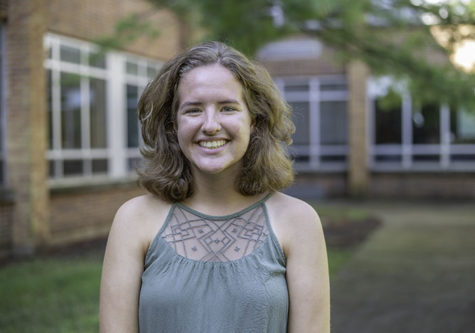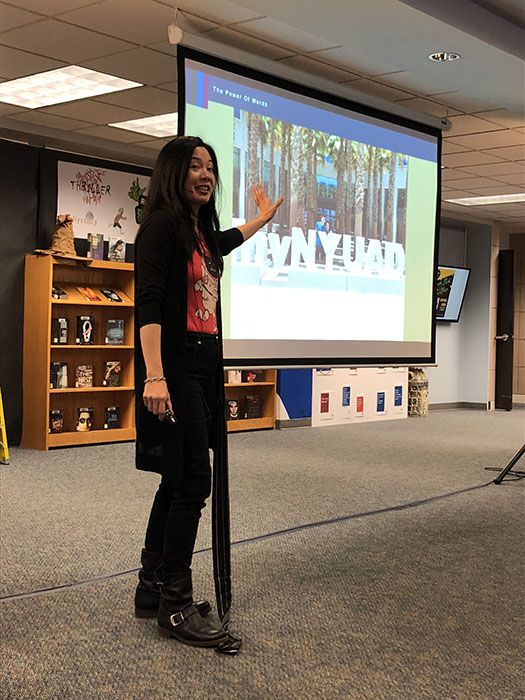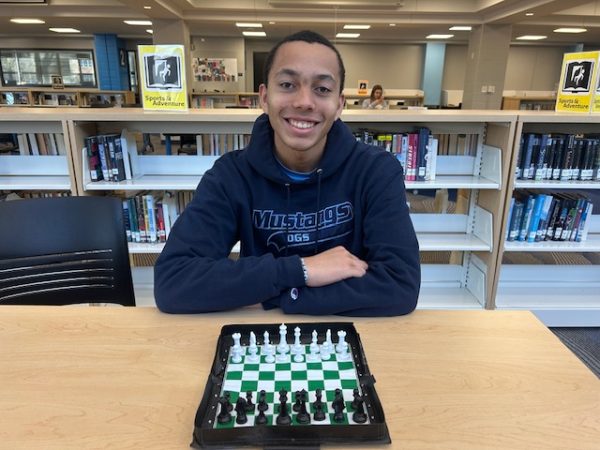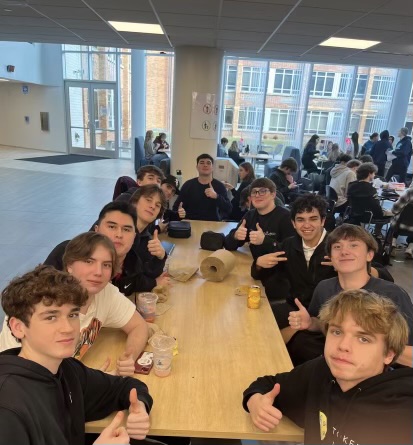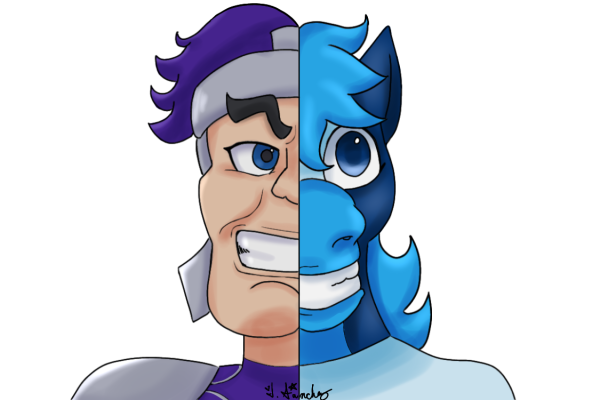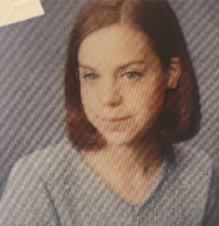Author Justina Chen inspires teens through storytelling
Justina Chen during her presentation to DGS students.
Young adult author Justina Chen visited students at DGS on Oct. 2 to promote her new novel, “Lovely, Dark, and Deep.” Third and fourth-period English classes were able to listen to her speak, as well the members of the book club. Chen is currently traveling around the US on her book tour.
Chen currently has six novels along with a few other books. She works as a coach and storyteller with several companies, including XBox, Minecraft and Halo, and has written books alongside the editor of the Harry Potter series.
Chen did not originally want to become an author, rather a journalist. Her traditional Asian family did not support that career goal.
“There were only three things I was going to be allowed to do with my life according to my parents. I could either become a doctor or a lawyer, but if I was really not smart I could go into business. Today I think they would say you could become a computer scientist and learn how to code. So when I told my parents I was going to be a journalist, you should’ve seen [them]. They went from Asian to White,” Chen said.
Chen’s decision to become an author was inspired through several encounters of racism she experienced early on in her career. One of these moments occurred when she was in Australia for a year-long business trip with Microsoft.
“I had just given a client presentation so I was all dressed up in my suit. I had a briefcase. I had walked off the train and a man in a business suit spit on my face…I just stood there like, ‘Are you kidding me?’ and I think those are the only words that came out of my mouth,” Chen said.
Being the first moment of racism she has encountered, Chen was unarmed and unable to fight back. The next time she encountered a significant event was at a Children’s museum with her two kids.
“A set of teenagers your age surrounded us and they did the ‘hoing toing moing’ thing. They were making fun of us in mock Chinese so I said, ‘Hey! Not cool. You guys, that is really racist,’” Chen said.
“After [we walked through the museum] the kids came to find us and apologize. They said, ‘We didn’t realize that it was racist.’ I said, ‘You know that was really courageous of you to come and apologize because that is something people don’t usually do.’ It takes a lot of courage to ask for forgiveness. So I said, ‘So do better! Now you know. Do better. Don’t do this again, and stop the other people when they do that because it’s just not cool,’” Chen said.
Moments like these inspired her first novel, “Nothing but the Truth (and a Few White Lies).” This novel speaks to Chen’s strong belief that representation is important for kids who do not always see people who look like them in meaningful positions.
According to freshman speech member Ensara Sejko, the main character in this book belongs to a traditional Asian family. Sejko attended Chen’s speech as a member of the book club.
“The teens in her books are not very fictional. They are based in real life while most books are super fictional. It gives me a real life vibe but fiction as well in it,” Sejko said.
Chen attempts to write meaningful messages for young adults in each of her books. In her novel “North of Beautiful,” she discusses the true meaning of beauty. Though a major part of the plot line was inspired by a girl on her book tour who asked if she could write a novel for kids whose parents have hurt them, the message was inspired by a family friend whose son was born with a large birthmark on his face.
“What would it be like to go through life with a birthmark? To have your dad, since you were a baby say you’re not pretty enough and force, as a baby, to go in and have laser surgery… every blast of that laser feels like hot oil being splattered on you. Could you imagine five hundred splatters on your face? Starting when you were a baby? To obliterate a birthmark. And I knew that was my story,” Chen said.
Aspiring writer and senior Aniya Garner finds the value of this message extremely important for students at DGS.
“Beauty standards are really critical in society and that’s what people like to go by but it doesn’t have to define each individual person. Within our school, people are really critical about the things you wear, the way you look. And they’ll say, ‘Oh we don’t care about what you wear because it’s just school,’ but in reality they’re always judging you,” Garner said.
DGS librarian Inmaculada Galan agreed that this was Chen’s most impactful message.
“That idea of you’re told so much, you’re not good enough. You’re not skinny, tall, anything and society has these preconceived ideas of what you should be like and how powerful it was to hear her say no. You are good enough. You have one body and this is how you go through life. Don’t let other people put their insecurities on you,” Galan said.
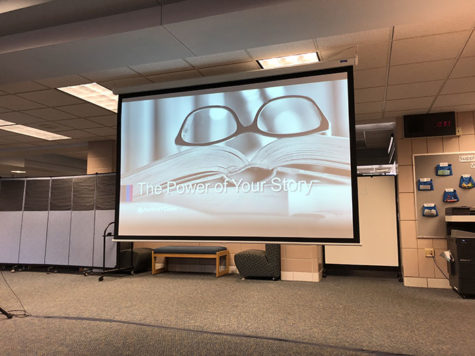
Chen’s most difficult book to write, “Return to Me,” was not received positively among critics. This novel was a letter to her kids after her divorce promoting the message of love and forgiveness.
“You see, 10 years ago, my then husband and I moved our kids to China, and we were supposed to be there for two years. Three weeks from that move to China I got a call from somebody at his office who warned me that he had been having an affair with his secretary, and that was why we moved to China,” Chen said.
While most of her books take one year to produce, this one took two. She felt the urge to make it perfect for her kids. Galan felt the transformation of characters in this novel sets Chen apart from other authors.
“‘In Return to Me’ the main protagonist [is] changing her life. Her dad wanted her to be an architect, but she loves to create small spaces. She had put her dreams aside to be the caretaker. Even the brother whose dad wants him to play football. The kid doesn’t like it. He wants to be a writer. He writes, he gets lost, he gets a journal for his birthday and can spend hours writing and that’s his passion. But all of those characters transform as the story went,” Galan said.
The most recent novel Chen wrote, “Lovely, Dark, and Deep,” was another book whose plotline was inspired by a family friend, Laurie Ham. She has six autoimmune diseases, including Lupus, making her unable to go outside on a sunny day. Though the novel’s main message is about hope, Chen includes some mini-lessons on gender equality.
“Can you say objectification? Why? Why? Why does this female superhero have to wear barely-there clothes? This is not beach volleyball people. Frankly, even that sport is a mystery to me. A male beach volleyball player seems to play just fine in boy shorts and shirts. Look, I get that being aerodynamic is a prerequisite for superheroes in uniform but consider this. Supermen: chin to toe coverage. Batman: head to toe coverage. Spider-man: face to toe coverage. And not one of them is photosensitive,” an excerpt from “Lovely, Dark, and Deep” said.
Perhaps the most impactful lesson that emerged from listening to Chen speak was the story of her perseverance. As a young Stanford student and aspiring writer, Chen’s professor knocked down her dreams by saying in front of her whole freshman creative writing class that she would never become a published author. Though at first she believed him, Chen did not let that stop her from pursuing her dreams.
This message stuck out most to freshman Mariya Smiyan.
“Even when other people see and say you are going to fail, you still move on and do what you want to do,” Smiyan said.
By coming to DGS, students were not only able to hear Chen’s story, but learn how to become better writers themselves. Garner explained how she is writing a novel herself and was able to receive some writing tips.
“[Chen] was talking about how the beginning and end of your book should shadow each other. I didn’t actually finish the book but I went and read the last page and compared it to the first page and when you actually read them back and back together you can see what she means,” Garner said.
Chen also recognized that writer’s block is a real struggle for not only students but the professionals. She explained what she does when she encounters this.
“As a creative writer, what I realize when I get stuck, it means that I’ve imposed my story on a character instead of letting the character take over the story,” Chen said.
English teacher Markus Indreika found this idea particularly important for his students who sometimes struggle to write.
“[In] her first novel, it was just a character that started talking to her and that character was really real to her and then the character takes on a life of its own. Whenever she gets writer’s block, it’s like she is trying to force the character to do something the character doesn’t want to do. And that sounds a little scary to me. I think what she did is she illustrated how dynamic art can be and you can’t always just put the tool in the box,” Indreika said.
Book club co-sponsor Kate Rogers finds that students hearing guest speakers can be extremely valuable in the education process.
“I always am [excited] when we have authors come because we have great teachers here who create great experiences for students. I think 50 minutes with a different person is memorable and invaluable. So I think whenever we have an author come, we have helped to create a memorable, unique experience for students,” Rogers said.
Through thick and thin, Justina Chen has made the most out of her life experiences by writing the lessons into her novels. In the end, she wants to encourage students to read her books because of the possible lessons they may be able to extract.
“So much of who you become is created at this moment in time. It’s both responsibility and possibility to encourage students, especially when we know there’s going to be tough times ahead, and pour into them so that they can also know their voice, know their power to really own their story,” Chen said.
Students can find any of Chen’s novels in the DGS library.

